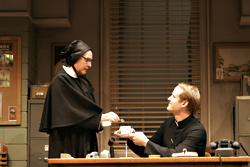Seattle Rep has struck gold with its production of Doubt, John Patrick Shanley’s Pulitzer Prize–winning play about the tense power struggle that erupts between a nun and a priest at a parochial school over suspected sexual indiscretions with the school’s only African-American student. Everything that could go wrong with this edgy, risky work—and plenty could— goes perfectly right, resulting in a performance that carries an emotional and intellectual wallop that reverberates long after the final curtain. Deftly avoiding easy sentimentality and ham-fisted moralism, director Warner Shook stages Shanley’s play with grace, confidence, and fierce economy. The set is gorgeous. The cast shines. Opening with a sermon that, like Chekhov’s proverbial Act I gun, ominously foretells the impending crisis, and ending on a note of shattering vulnerability that casts a shadow backward on all that has come to pass, Doubt offers, in a mere 90 minutes, an illuminating example of everything theater can and should do. It’s a vital and exhilarating piece of work.
Set in the Bronx in 1964—a time when the controversial reforms of Vatican II began to alter the infrastructure of the traditional Catholic Church—Doubt focuses almost exclusively on the triangular relationship of three characters. Father Flynn (Corey Brill) is a young, energetic priest for whom cleanliness is next to godliness (“keep those fingernails clean, kids”), and whose sense of adventure and gaiety stands in stark contrast to the church’s moribund rituals and traditional orthodoxy; Sister Aloysius (Kandis Chappell), the school’s principal, is a stern, sharp-witted taskmaster with a dim view of human nature and little patience for anything that challenges church tradition or rote learning; Sister James (Melissa D. Brown) stands between them, a spirited and compassionate teacher who nonetheless shows an almost overweening willingness to toe Sister Aloysius’ conservative line.
When Sister James reports to Sister Aloysius that she witnessed Flynn taking a young student alone into his office, and that when the child returned to class he appeared distressed and had alcohol on his breath, the principal takes action with the weary efficiency of one resigned to the ways of corruption. When, by way of a ruse, she confronts the priest, he balks at revealing any details. Pushed to the limit, however, he reluctantly explains that he was protecting a wayward child, as well as the school, from further damage resulting from a child’s poor judgment. Sister Aloysius is unswayed, and continues to press the case with relentless, furious conviction, enlisting Sister James in her cause.
At every turn, Doubt foils audience expectations—each moment shades to gray. And it’s not only the play’s central question that remains unanswered and steeped in uncertainty. A single look or offhand remark can blur the ethical, psychological, or emotional distinctions between characters. Issues of individual motivation are continuously revealed and then reversed, creating a suspense that is practically unbearable. The play is also surprisingly funny, thanks in large part to Shanley’s sharp, sophisticated dialogue and strong feeling for character. Director Shook is blessed with wonderful acting all around, especially Chappell’s intricately layered, deeply humane approach to a role that could easily truck in stereotype. And Cynthia Jones lights up the stage as Mrs. Muller, the child’s mother. Her portrayal of a woman whose trampled humanity has given her a brutally street-smart instinct for survival is shattering.
In a world quickly being polarized by good and evil, black and white, Doubt throws a welcome wrench into the sound-bite machinery of quick cures and easy answers. Like the best art, it complicates our understanding of a difficult issue and trips us on our rush to take sides.
DOUBT Seattle Repertory Theatre, Seattle Center, 206-443-2222, www.seattlerep.org. $10–$48. 7:30 p.m. Various times and days. Through Oct. 21.








